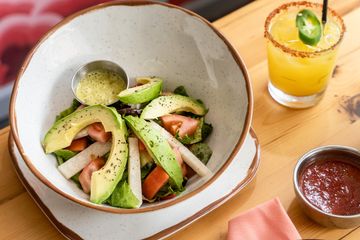Explore tacos filled with regional fillings for any occasion
Wiki Article
Is Mexican Food Healthy And Balanced? Unloading the Nutritional Conveniences of Traditional Components
The inquiry of whether Mexican food is healthy invites an expedition of its standard ingredients. Beans and corn work as fundamental staples, rich in protein and fiber. Avocados supply beneficial fats, while numerous natural herbs and flavors include taste and health advantages - mexican food. Together, these elements produce a tapestry of nutrition. However, the healthiness of Mexican food commonly depends on preparation methods and part sizes. What function do these elements play in establishing its overall nutritional worth?The Power of Beans: Protein and Fiber-Rich Staples
Commonly neglected, beans serve as a keystone of Mexican food, using a wealth of nutritional benefits. Rich in protein, they are an exceptional plant-based option for those seeking to fulfill their dietary healthy protein needs. This high protein content supports muscle mass repair work and growth, making beans indispensable for both vegetarians and meat-eaters alike. Additionally, beans are a phenomenal source of nutritional fiber, which assists in digestion and promotes a sensation of fullness, potentially assisting with weight monitoring.The selection of beans made use of in Mexican meals, such as black beans, pinto beans, and kidney beans, contributes to a diverse taste account and can enhance meals nutritionally. Beans are reduced in fat and have crucial vitamins and minerals, including iron, folate, and magnesium. Together, these features make beans an essential active ingredient, supplying both sustenance and sustenance in traditional Mexican fare.

Corn: a Versatile Grain With Nutritional Benefits
Corn stands apart as a functional grain essential to Mexican cuisine, celebrated not just for its culinary applications however additionally for its excellent nutritional account. As a main component in meals like tortillas, tamales, and pozole, corn gives essential nutrients that contribute to a balanced diet plan. Rich in carbohydrates, it acts as a substantial power source, while likewise being reduced in fat, making it a favorable alternative for numerous nutritional requirements.Corn is an excellent source of nutritional fiber, which assists in digestion and promotes satiety. It consists of substantial quantities of vitamins such as B-complex vitamins, which are vital for basal metabolism. The visibility of antioxidants, especially carotenoids, contributes to general health by minimizing oxidative tension. Additionally, corn is gluten-free, providing to those with gluten sensitivities. In general, the nutritional advantages of corn emphasize its significance in standard Mexican food and its function in a healthy and balanced diet.
Avocados: Healthy Fats and Nutrients in Every Bite
Avocados play a significant function in Mexican food, enhancing recipes with their creamy structure and abundant flavor. Past their culinary charm, avocados are celebrated for their excellent nutritional profile. They are a rich source of healthy and balanced monounsaturated fats, which can help lower negative cholesterol degrees and support heart health and wellness. Furthermore, avocados are packed with crucial nutrients, including potassium, vitamin E, and B vitamins, contributing to overall health.The high fiber web content in avocados aids food digestion and advertises satiation, making them an advantageous enhancement to any type of meal. Their distinct nutrient composition can also support skin health and wellness and offer anti-inflammatory advantages. Incorporating avocados right into standard Mexican recipes or enjoying them as a standalone treat can boost both taste and nutrition, showing why they are a precious staple in Mexican cuisine. In general, avocados supply a scrumptious method to take pleasure in healthy and balanced fats and crucial nutrients in every bite.

Spices and Herbs: Flavorful Health Boosters
While enjoying the abundant flavors of Mexican food, one can not forget the essential duty that spices and herbs play in boosting both preference and health and wellness. Active ingredients such as cilantro, chili, and oregano peppers not just add to the dynamic flavor profile however additionally supply significant health advantages. For circumstances, cilantro is known for its detoxing properties, assisting to eliminate heavy steels from the body, while oregano is loaded with anti-oxidants and has anti-inflammatory effects.Chili peppers, a staple in several Mexican dishes, have capsaicin, which has been connected to boosted metabolism and discomfort alleviation. Furthermore, seasonings like cumin and coriander assistance digestion and might help in blood sugar guideline. Integrating these savory wellness boosters right into meals not only enhances the cooking experience yet likewise advertises overall wellness, making Mexican cuisine not simply delicious, but additionally nutritionally advantageous.
Typical Cooking Approaches: Enhancing Nourishment and Flavor
Typical cooking approaches in Mexican cuisine play an essential function in improving both nourishment and taste, as they commonly prioritize classic techniques and fresh components. Strategies such as nixtamalization, where corn is soaked and cooked in an alkaline remedy, not just boost the nutrient profile of tortillas yet likewise enhance their digestibility - churros. Furthermore, using sluggish food preparation approaches, like cooking or braising, enables tastes to fuse wonderfully while maintaining the stability of the ingredients
Often Asked Concerns
Are Mexican Food Portions Usually Larger Than Other Foods?
Mexican food sections are often larger than those of numerous various other cuisines. This characteristic mirrors traditional eating practices, stressing public sharing and hearty meals, which can bring about an extra substantial offering dimension generally.
Exactly how Does the Preparation Method Affect Healthiness of Mexican Food?
Prep work techniques greatly affect the healthiness of Mexican food. Methods such as cooking or steaming protect nutrients, while frying can increase unhealthy fat content. Selections of active ingredients and cooking designs inevitably establish general nutritional value.Can Mexican Food Be Customized for Details Dietary Restrictions?
Mexican food can without a doubt be customized for certain nutritional limitations. Substitutions, such as utilizing corn tortillas for gluten-free diet regimens or including even more veggies, allow individuals to take pleasure in traditional tastes while fitting various nutritional demands.What Prevail False Impressions Regarding Mexican Food and Health?
Common false impressions about Mexican food include the belief that it is naturally harmful, extremely hot, and only focused on fats. In truth, traditional recipes frequently include healthy components and can be tailored to various dietary requirements.Exist Much Healthier Options at Mexican Dining Establishments?
Healthier alternatives at Mexican restaurants often include barbequed meats, beans, and fresh veggies. Selecting recipes that emphasize whole active ingredients and avoiding hefty sauces can result in an extra healthy eating experience, promoting general health.The selection of beans utilized in Mexican recipes, such as black beans, pinto beans, and kidney beans, adds to a varied flavor account and can improve meals nutritionally. Avocados play a significant function in Mexican food, complementing recipes with their luscious structure and abundant flavor. Including avocados into typical Mexican meals or enjoying them as a standalone treat can boost both taste and nutrition, demonstrating why they are a cherished staple in Mexican food. While enjoying the rich tastes of Mexican cuisine, one can not forget the important role that spices and natural herbs play in enhancing both preference and health and wellness. Standard food preparation methods in Mexican food play an essential role in improving both nourishment and flavor, as they typically prioritize classic methods and fresh ingredients.
Report this wiki page